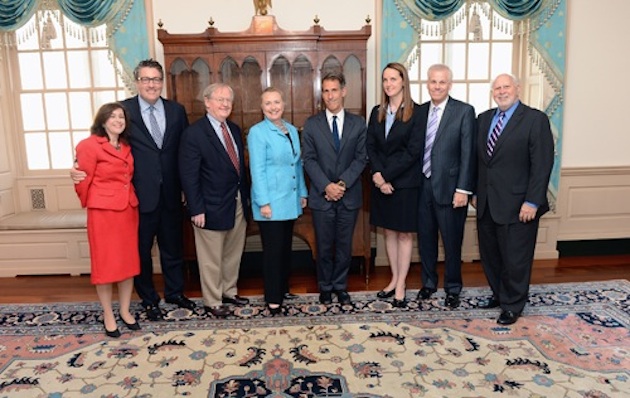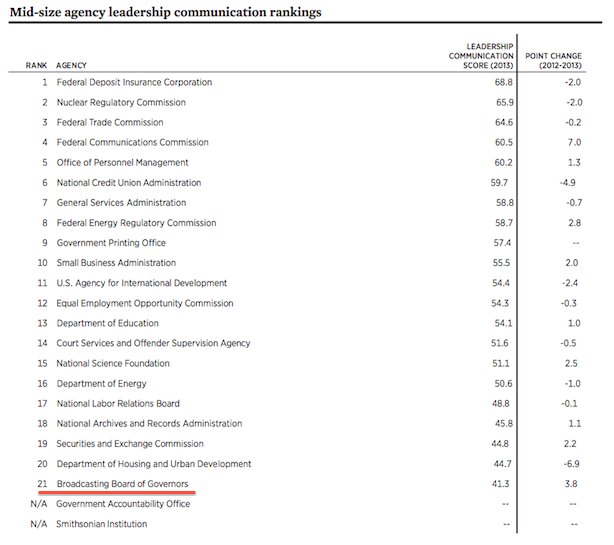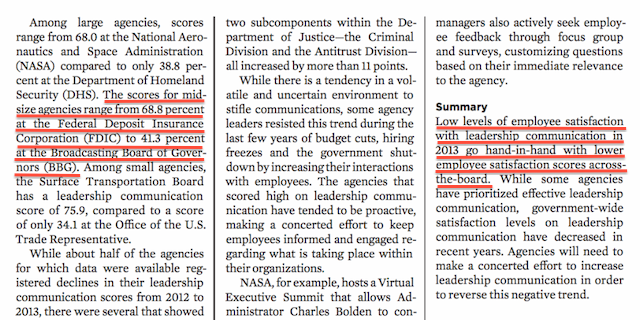BBG Watch Commentary
In a recent interview with CNN’s Fareed Zakaria GPS and in her latest book, Hard Choices, former Secretary of State Hillary Clinton bemoaned the post-Cold War decline of U.S. information outreach abroad, primarily through the Voice of America (VOA), but also through other U.S.-funded media outlets.
CLINTON WITH CNN‘s FAREED ZAKARIA GPS: “We were going to contain the Soviet Union and stop the march of communism. And by doing so, we didn’t just rely on building up our nuclear weaponry, we relied on telling our story.
That’s what we did through all kinds of media, you know, the Voice of America is the most obvious example, but also the constant outreach that we were involved in. I remember Vaclav Havel telling me that, you know, during the depths of his struggle against the Soviet Union in what was then Czechoslovakia, it was American culture, it was – it was the music, it was the plays and theater that kept him going, because it gave him an understanding of what was possible.
And so the, you know, the Soviet Union falls. Putin’s very upset about that. We’re very triumphant about that. And we basically felt great, we’re done. Democracy has triumphed. This is the end of history. That was so short-sighted.
And now we are in this period where we have to go back out and sell ourselves. It’s not to be taken for granted. What do we stand for and how do we intend to lead and manage? How do we try to enlist the rest of the world in this struggle between cooperation and order and conflict and disorder, which is really at the root of so much that’s going on today. And I don’t think we’ve done a very good job of that.”
VIDEO & TRANSCRIPT: Fmr. Sec. Hillary Clinton to Fareed Zakaria: Putin indirectly responsible for MH17, CNN Press Room Blog, July 27, 2014.
During testimony on January 23, 2013 before the House Foreign Affairs Committee meeting chaired by Rep. Ed Royce (R-CA), then Secretary of State, Hillary Clinton stated that the “Broadcasting Board of Governors is practically defunct in terms of its capacity to be able to tell a message around the world. So we’re abdicating the ideological arena and we need to get back into it.”
The Voice of America (VOA) is the largest media element of the BBG with the largest budget (approximately $200 million) outside of the enormous BBG bureaucracy and media support element, the International Broadcasting Bureau (IBB), which controls more than $240 million of BBG’s entire $700 million plus annual budget. Radio Free Europe / Radio Liberty (RFE/RL), Radio Free Asia (RFA) and Radio Sawa and Alhurra TV — all semi-private, so-called “surrogate broadcasters” reporting to the BBG — have much smaller budgets to provide mostly local news to countries that practice censorship or do not have a developed and freely functioning domestic media. (Radio and TV Marti, a federal entity like VOA, directs its largely surrogate programs to Cuba.)
SECRETARY OF STATE HILLARY CLINTON: “And finally, we need to do a better job conveying a counter-narrative to the extremist Jihadist narrative. You know, I’ve said this to this Committee before — a lot of new members on it — you know, we have abdicated the broadcasting arena. You know, yes, we have private stations: CNN, Fox, NBC, all of that. They are out there, they convey information, but we’re not doing what we did during the Cold War.”
“Our Broadcasting Board of Governors is practically defunct in terms of its capacity to be able to tell a message around the world. So we’re abdicating the ideological arena, and we need to get back into it. We have the best values. We have the best narrative.”
“Most people in the world just want to have a good decent life that is supported by a good decent job and raise their families and we’re letting the Jihadist narrative fill a void. We have to get in there and compete and we can do it successfully.”
 In her latest book, Hard Choices, Hillary Clinton also talks about the failure of U.S. media outreach abroad:
In her latest book, Hard Choices, Hillary Clinton also talks about the failure of U.S. media outreach abroad:
HILLARY CLINTON IN HARD CHOICES: “To help us better tell America’s story and to the on critics, I turned to one of the country’s smartest media executives, Judith McHale, to come on board as Under Secretary of Public Diplomacy and Public Affairs. She had helped found and lead MTV and the Discovery Channel, and is the daughter of a career Foreign Service officer. In that capacity she helped us explain our policies to a skeptical world, push back against extremist propaganda and recruiting, and integrate our global communications strategy with the rest of our smart power agenda. She was also my representative to the Broadcasting Board of Governors, which oversees the Voice of America and other U.S.-funded media around the world. During the Cold War, this was an important part of our outreach, giving people locked behind the Iron Curtain access to uncensored news and information. But we had not kept up with the changing technological and market landscape. Judith and I agreed we needed to overhaul and update our capabilities, but it proved to be an uphill struggle to convince either Congress or the White House to make this a priority.”
Clinton Rodham, Hillary. Hard Choices. New York: Simon & Schuster, 2014, pp. 179-180.
Reform of U.S. International Broadcasting
On Monday, the House of Representatives approved in a voice vote the bipartisan legislation, the United States International Communications Reform Act of 2014 (H.R. 4490). Introduced by Chairman of the House Foreign Affairs Committee Rep. Ed Royce (R-CA) and Rep. Eliot Engel (D-NY), the Committee’s Ranking Member, the bill was unanimously passed by the Foreign Affairs Committee in April. A similar bill to reform U.S. international broadcasting is in the works in the Senate.
The bill quotes Hillary Clinton and lists other major management problems at the Broadcasting Board of Governors.
SEC. 2. FINDINGS AND DECLARATIONS.
Congress finds and declares the following:
(1) United States international broadcasting exists to advance the United States interests and values by presenting accurate, objective, and comprehensive news and information, which is the foundation for democratic governance, to societies that lack a free media.
(2) Article 19 of the Universal Declaration of Human Rights states that ‘‘[e]veryone has the right to freedom of opinion and expression’’, and that ‘‘this right includes freedom to hold opinions without interference and to seek, receive and impart information and ideas through any media and regardless of frontiers’’.
(3) Secretary of State Hillary Clinton testified before the Committee on Foreign Affairs of the House of Representatives on January 23, 2013, that the Broadcasting Board of Governors (BBG) ‘‘is practically a defunct agency in terms of its capacity to be able to tell a message around the world. So we’re abdicating the ideological arena and need to get back into it.’’. [Emphasis added.]
(4) The BBG, which was created by Congress to oversee the United States international broadcasting in the wake of the Cold War, has, because of structural and managerial issues, had limited success to date in both coordinating the various components of the international broadcasting framework and managing the day-to-day operations of the Federal components of the international broadcasting framework.
(5) The lack of regular attendance by board members and a periodic inability to form a quorum have plagued the BBG and, as a result, it has been functionally incapable of running the agency.
(6) The board of governors has only achieved the full slate of all nine governors for seven of its 17 years of existence, which highlights the difficulties of confirming and retaining governors under the current structure.
(7) Both the Department of State’s Office of Inspector General and the Government Accountability Office have issued reports which outline a severely dysfunctional organizational structure of the Broadcasting Board of Governors.
(8) The Inspector General of the Department of State concluded in its January 2013 report that dysfunction of the BBG stems from ‘‘a flawed legislative structure and acute internal dissension’’.
(9) The Inspector General of the Department of State also found that the BBG’s structure of nine part-time members ‘‘cannot effectively supervise all United States Government-supported, civilian international broadcasting’’, and its involvement in day-to-day operations has impeded normal management functions.
(10) The Government Accountability Office report determined that there was significant overlap among the BBG’s languages services, and that the BBG did not systematically consider the financial cost of overlap.
(11) According to the Office of the Inspector General, the BBG’s Office of Contracts is not in compliance with the Federal Acquisition Regulation, lacks appropriate contract oversight, and violates the Anti-Deficiency Act. The Office of the Inspector General also determined that the Broadcasting Board of Governors has not adequately performed full and open competitions or price determinations, has entered into hundreds of personal service contracts without statutory authority, and contractors regularly work without valid contracts in place.
(12) The size and make-up of the BBG workforce should be closely examined, given the agency’s broader broadcasting and technical mission, as well as changing media technologies.
(13) The BBG should be structured to ensure that more taxpayer dollars are dedicated to the substantive, broadcasting, and information-related elements of the agency’s mission.
(14) The lack of a coherent and well defined mission of the Voice of America has led to programming that duplicates the efforts of the Office of Cuba Broadcasting, Radio Free Asia, RFE/RL, Incorporated, and the Middle East Broadcasting Network that results in inefficient use of tax-payer funding.
(15) The annual survey conducted by the ‘‘Partnership for Public Service’’ consistently ranks the Broadcasting Board of Governors at or near the bottom of all Federal agencies in terms of ‘‘overall best places to work’’ and ‘‘the extent to which employees feel their skills and talents are used effectively.’’ The consistency of these low scores point to structural, cultural, and functional problems at the Broadcasting Board of Governors.
(16) The Federal and non-Federal organizations that comprise the United States international broadcasting framework have different, yet complementary, missions that necessitate coordination at all levels of management.
(17) The Broadcasting Board of Governors has an overabundance of senior civil service positions, defined here as full-time employees encumbering GS–14 and GS–15 positions on the General Schedule pay scale.
(18) United States international broadcasting should seek to leverage public-private partnerships, including the licensing of content and the use of technology owned or operated by non-governmental sources, where possible to expand outreach capacity.
(19) Congressional action is necessary at this time to improve international broadcasting operations, strengthen the United States public diplomacy efforts, enhance the grantee surrogate broadcasting effort, restore focus to news, programming, and content, and maximize the value of Federal and non-Federal resources that are dedicated to public diplomacy and international broadcasting.
The reform bill enjoys wide support among former BBG members, leaders of U.S. human rights organizations and ethnic communities, current and former Voice of America executives and journalists, especially those who have worked in VOA language services, and the BBG federal employee union AFGE Local 1812.
There is, however, strong opposition to the bill among the BBG’s International Broadcasting Bureau and Voice of America executives and from at least one current BBG member Matt Armstrong who has called the congressional criticism of the agency “dated, “overly harsh,” “not fair” and “less than inarticulate” [sic].
Congressional sources told BBG Watch that Armstrong, who is a Republican member of the BBG, appears to be unhappy with not being sufficiently consulted about drafting the bill and apparently personally favors even stronger links between U.S. international broadcasting and public diplomacy. BBG Chair Jeff Shell reportedly urged BBG members not to comment publicly on the legislation one way or another. He posted a carefully-worded op-ed in Time, “Why the Broadcasting Board of Governors Is Nothing Like RT.” He is believed to be a strong supporter of management reforms, although he may privately not agree with every provision of the reform legislation, sources told BBG Watch.
Vocal opposition to the bill’s wording about the Voice of America’s mission, is centered among some current and former VOA Central English Newsroom reporters. They fear that VOA would lose its journalistic independence and become an arm of U.S. public diplomacy if the bill is signed into law. In a Los Angeles Times op-ed titled, “Back off, Congress, and keep Voice of America real,” VOA English News correspondent Al Pessin wrote that Congress was trying “to remake it [Voice of America] into something fundamentally not American” and transform VOA “into a Russian- or Chinese-style state broadcaster.” VOA director David Ensor reportedly thanked Al Pessin for writing his op-ed.
A somewhat more reasoned and more balanced analysis of the bill by its critics was an op-ed on BBG Watch by Alex Belida and Sonja Pace, former senior news executives and foreign correspondents with VOA, “Don’t Silence America’s Voice.” Mr. Belida and Ms. Pace wrote: “Reliable inside sources tell us over 100 VOA journalists have banded together asking Congress to preserve and protect VOA’s journalistic integrity. They vehemently object to provisions in the bill that VOA ‘promote’ the broad foreign policies of the United States and that VOA is to be given direction from the CIA and the Pentagon. They know that would be the death knell for the organization and the principles it has so long cherished.”
Members of Congress, including Rep. Eliot Engel, categorically deny that they have any intention of allowing the U.S. executive branch to interfere with VOA news or to turn VOA into a propaganda outlet on behalf of any U.S. administration, but they definitely want VOA to do more reporting on U.S. news and U.S. policies, which VOA is already obligated to do under its 1976 Charter but often fails to provide such coverage reliably and comprehensively.
Most recently VOA failed to report on the House vote in favor of new sanctions against North Korea while posting the next day a feature about North Korean beer that sounded like a press release, “Beer – Yes, but no Voice of America report on North Korea sanctions vote in Congress.” The bill in its current version might restrict surrogate news reporting by VOA, although it does provide for international news reporting. The final wording may still be changed in any Senate version of the bill.
 Even opponents of the bill among VOA English Newsroom reporters are strongly in favor of management reforms. They have near zero confidence in the current VOA and IBB top leadership. One VOA English reporter posted anonymously a satirical letter titled, “Dear John Letter from VOA Girl,” about the failures of Voice of America executives.
Even opponents of the bill among VOA English Newsroom reporters are strongly in favor of management reforms. They have near zero confidence in the current VOA and IBB top leadership. One VOA English reporter posted anonymously a satirical letter titled, “Dear John Letter from VOA Girl,” about the failures of Voice of America executives.
Under its current management, the Voice of America is nowhere near its foreign competition when it comes to online audience engagement and social media, while IBB and VOA executives also cut back on direct radio broadcasts without properly notifying audiences and VOA program hosts. VOA English News Twitter has fewer Twitter followers (109K) than the UN Peacekeeping Force Twitter (132K) and nearly ten times fewer than theU.S. State Department Twitter (998K) and more than six times fewer followers than Russia’s RT Twitter (706K).
On YouTube, RT English has over one million, three hundred thousand subscribers and over one billion, two hundred million views. VOA English News YouTube has only 36 thousand subscribers and 35.8 millionviews.
Then U.S. Secretary of State Hillary Clinton speaking on March 2, 2011 at a Senate Foreign Relations Committee hearing in Washington, DC said that the U.S. is losing the information war.
SECRETARY OF STATE HILLARY CLINTON: “We are engaged in an information war. You know, during the Cold War we did a great job in getting America’s message out. After the Berlin Wall fell, we said: ‘Okay, fine, enough of that. We’ve done it. And unfortunately we are paying a big price for it.”
“Our private media cannot fill that gap. In fact, our private media, particularly cultural programming, often works at counterpurposes to what we truly are as Americans and what our values are. I remember having an Afghan general tell me that the only thing he thought about Americans is that all the men wrestled and the women walked around in bikinis, because the only TV he ever saw was ‘Baywatch’ and [professional wrestling shows].”
“So we are in an information war, and we are losing that war. I’ll be very blunt in my assessment. Al-Jazeera is winning. The Chinese have opened up a global English language and multilanguage television network. The Russians have opened up an English language network. We’ve seen it in a few countries, and it is quite instructive. We are cutting back. The BBC is cutting back.”
“Most people still get their news from TV and radio. So even though we’re pushing online, we can’t forget TV and radio. And so I would look very much toward your cooperation to try to figure out how we get back in the game on this.”

H.R. 4490 is a bipartisan response from Congress to Hillary Clinton and other critics who want to reform the Voice of America together with the rest of the Broadcasting Board of Governors. But in reporting on the unanimous passage of the bill by the House on Monday, the Voice of America produced what critics described as a news report that lacked balance and showed bias. While the report quoted members of Congress speaking in favor of the bill and Mrs. Clinton’s earlier criticism, it failed to mention any outside support for the legislation, including support from current and former VOA journalists, their union, U.S. human rights organizations, and leaders of ethnic communities. In reacting to the VOA report, a senior Congressional staffer made this comment:
SENIOR CONGRESSIONAL STAFFER: “There’s a level of irony here… VOA claiming their journalistic integrity is under attack and then putting out stories that make their journalistic integrity seem questionable.
Very disappointing.”
The critic of the bill whom the VOA report quoted without mentioning a letter of support for the bill sent to President Obama was former VOA Deputy Director Alan Heil.
“If that bill becomes law, VOA’s worldwide following on radio, TV, and online channels would plummet precipitously,” Heil said. “The Voice’s greatest asset, its credibility, would be in shreds,” VOA News and some other media reported Alan Heil as saying in response to the overwhelming passage of the legislation by the House of Representatives on Monday.
Some congressional and other other observers suspect that Mr. Heil and Mr. Pessin are exaggerating the threat from the U.S. Congress against VOA’s journalistic freedom through any future link with U.S. public diplomacy in order to get the legislative wording modified in the Senate version of the bill. The AFGE Local 1812 employee union, which unlike Mr. Pessin and Mr. Heil, strongly supports H.R. 4490, is also working on the Hill to clarify and improve the bill’s language to ensure VOA’s news integrity while fighting to preserve the bill’s proposed management reforms.
Congressional and VOA observers point out that while Mr. Heil is now highly critical of the new reform bill, for many years he was part of the VOA senior management team that had worked very closely with the U.S. public diplomacy establishment of the former United States Information Agency (USIA). During that time, the USIA/VOA management team severely restricted journalistic freedom of VOA language services by denying them access to wire service reports and restricting topics language service reporters could cover on their own. They doubt that VOA could ever become as restricted as it was when Mr. Heil had been the program chief, especially in terms of what VOA language services could or could not report.
Mr. Heil, who is also the author of Voice of America: A History, apparently worries that Voice of America might be required to support U.S. public diplomacy with its future news reporting, which was more or less what VOA was doing when he was VOA program chief. At that time, Mr. Heil’s bosses were White House political appointees, VOA was part of the United States public diplomacy agency and Foreign Service Officers, from both USIA and the State Department, occupied key managerial positions within VOA.
In early years of Mr. Heil’s executive tenure, VOA foreign correspondents had to use diplomatic passports for foreign news reporting travels and cleared their trips with U.S. Embassies. VOA foreign language services were kept on a short leash and their journalists were not allowed access to wire service reports lest they might report something that could get VOA executives in trouble with USIA, the State Department or the White House. Still, even then VOA reporters, both in the VOA English newsroom and in the language services, tried to preserve their journalistic independence, did their job, and VOA still had large audiences around the world.
It seems doubtful that H.R. 4490, if it becomes law, would bring about anything close to what Mr. Heil experienced at VOA when it was clearly part of the U.S. public diplomacy structure under USIA. Ironically, VOA reached the height of its popularity during the Reagan years when Mr. Heil was still occupying higher management positions at VOA. By then, many of the restrictions had already been lifted and VOA language services achieved a measure of independence and could originate their own news coverage.
A congressional staffer told BBG Watch that Mr. Heil met many times with the congressional drafters of H.R. 4490 and offered various suggestions, some of which were incorporated into the bill.
Besides the vocal critics of the bill, many VOA staffers, especially those working in the language services, as well as their union, AFGE Local 1812, see the proposed legislation as the only way of saving their agency, preserving VOA’s federal status, and protecting their jobs from one of the most incompetent management team in the federal government.
They say that they would rather side with Hilary Clinton, hold on to their jobs and fight for their journalistic independence under a strong and well-managed agency than become victims of the agency’s possible destruction by incompetent bureaucrats if Congress should decide that the BBG cannot be reformed and vote to defund the Voice of America.
As Mrs. Clinton observed repeatedly, the executives in charge of communicating with the world on behalf of the United States have some of the worst communication and management skills and have made the agency practically defunct in its ability to do media outreach.
Perhaps one of the most embarrassing examples of the recent management meltdown at VOA were dozens of VOA reports on the British royal family, while important Washington political news developments were not covered or only partially covered. Another embarrassment was a VOA promotional video for Pakistan featuring a blood-thirsty zombie character dressed like Uncle Sam attacking a Pakistani.
Mrs. Clinton’s observations about the Voice of America’s decline were confirmed in a just released study by the Partnership for Public Service which found that BBG managers, including VOA executives, are still dead last among mid-size federal agencies in internal communication skills.
The BBG is still rated as the worst mid-size agency for internal communication even though IBB and VOA executives gave employees time off and offered them other incentives, such as a bingo night at a federal building, to encourage employees to participate in the survey and to give them a better rating. They may have gotten a few more managers to rate themselves as being good, but that did not change the overall low score.



